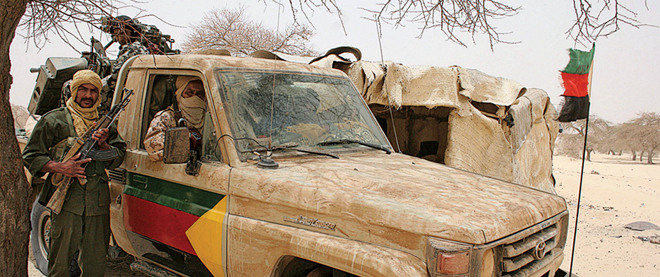Tuareg rebels launch media campaign after claiming northern Mali
It’s a new way for the Tuareg people to build support for a state of their own
Share

The nomadic Tuareg people of the Sahara Desert are not as isolated as you might think. Armed Tuareg rebels, who claimed the northern half of Mali as their own state last month, are using a modern Internet and media campaign to build support for a state they call “Azawad.” The rebels, along with several Islamist militia groups, were able to take control of the territory in the chaos following a military coup by Malian soldiers on April 6.
The Tuareg group National Movement for the Liberation of Azawad, known by the French acronym MNLA, issued Azawad’s declaration of independence on its website, mnlamov.net. French and English communiqués boast of the rebels’ “liberation” of various Malian cities, and dispute claims that the movement is dominated by pro-Moammar Gadhafi mercenaries. Site visitors can weigh in on the creation of an independent Tuareg state in a Web poll, check out photo galleries of rebels in action and watch YouTube videos of rebels in traditional wraparound scarves.
The site isn’t actually aimed at people in Mali, where just two per cent of the population uses the Internet, but at governments and journalists in the West. “They’re trying to convince people outside of Mali that they represent people there, and that they’re worthy of being included in negotiations,” says Will Reno, a Northwestern University specialist on rebel movements. “It’s like the peacock raising its feathers to attract attention.”
When the Internet first reached this part of Africa around 2001, the Tuareg quickly realized its potential, says professor Jeremy Keenan, a Mali expert at the University of London. “They realized they could start controlling their economy, which was primarily based on tourism, by jumping over their own corrupt bureaucrats and dealing directly with European travel agencies and individuals.” From there, it was only natural for the Tuareg to set up websites to get their political message out.
The MNLA site has more in common with old-fashioned propaganda pamphlets than the grassroots social media movements that emerged in the Arab Spring and Iran’s Green Movement. Armed militias, increasingly, have begun turning to the Web to spread their message. Somalia’s al-Shabaab, for example, has an active Twitter account. The tweets range from links to high-quality videos intended to draw recruits from the Somali diaspora, to calls for Muslims to wage jihad, to warnings that Somali transitional government officials will be hunted down and executed. Indeed, “when the Kenyans attack al-Shabaab,” says Keenan, “Kenyan and Shabaab commanders tweet back and forth.”
Africa watchers say the MNLA’s site may have earned the Tuareg rebels some sympathetic international press in the rebellion’s early days, allowing them to transmit a simple message of an oppressed ethnic group fighting to free its homeland. The reality on the ground is much more complicated: rebel groups affiliated with al-Qaeda control much of the region, and a large part of the local population have no interest in an independent Tuareg state. So far, the Tuareg media campaign hasn’t been enough to turn the tide of international opinion. “They can communicate with the outside world more directly, which they couldn’t do at all before,” says Keenan. But “they have no support whatsoever in the international scene.”